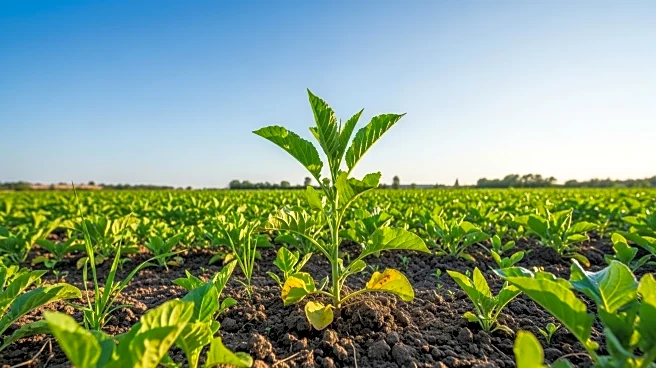What is the story about?
What's Happening?
Punjab, India, is facing severe environmental stress due to climate change, including falling groundwater levels, soil degradation, and air pollution from stubble burning. The state's annual groundwater extraction rate is 163.76%, leading to predictions that resources could be exhausted in 14 years. Stubble burning releases harmful pollutants, exacerbating climate change and public health issues. The overuse of chemical fertilizers has degraded soil health, leading to low agricultural yields and rising farmer debt. Regenerative agriculture offers a solution by addressing water scarcity, poor soil health, and air pollution. Practices such as direct seeding of rice, crop diversification, drip irrigation, and rainwater harvesting are being promoted to conserve water and restore soil health. The Roundglass Foundation is training farmers in these methods to improve outcomes for water conservation, soil regeneration, and air quality.
Why It's Important?
The adoption of regenerative agriculture in Punjab is crucial for addressing the state's environmental challenges and ensuring food security. By reducing water usage and chemical inputs, these practices can restore ecological balance and improve farm profitability. The shift towards sustainable farming is essential to prevent ecological collapse and alleviate rural distress. Regenerative agriculture not only enhances resilience to climate change but also supports economic stability by reducing input costs and increasing yields. The initiative has broader implications for sustainable development, highlighting the need for collective action to address environmental issues and promote sustainable livelihoods.
What's Next?
Punjab must continue to implement regenerative agriculture practices to achieve long-term sustainability. The focus will be on expanding crop diversification, improving water management, and reducing harmful practices like stubble burning. Stakeholders, including government agencies, NGOs, and civil society, need to collaborate to address environmental distress and promote sustainable farming. The success of these initiatives could serve as a model for other regions facing similar challenges, emphasizing the importance of sustainable agricultural practices in combating climate change.
Beyond the Headlines
The shift towards regenerative agriculture in Punjab reflects a broader cultural and ethical commitment to sustainability. By prioritizing ecological balance and farm profitability, these practices challenge traditional agricultural models and promote a more holistic approach to farming. The emphasis on water conservation, soil health, and air quality improvement highlights the interconnectedness of environmental and human health. The initiative underscores the need for systemic change in agricultural practices to achieve long-term sustainability and resilience.
















